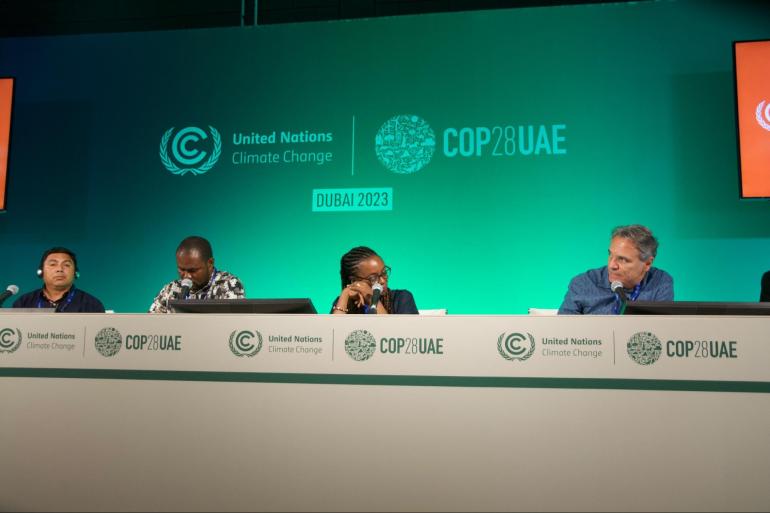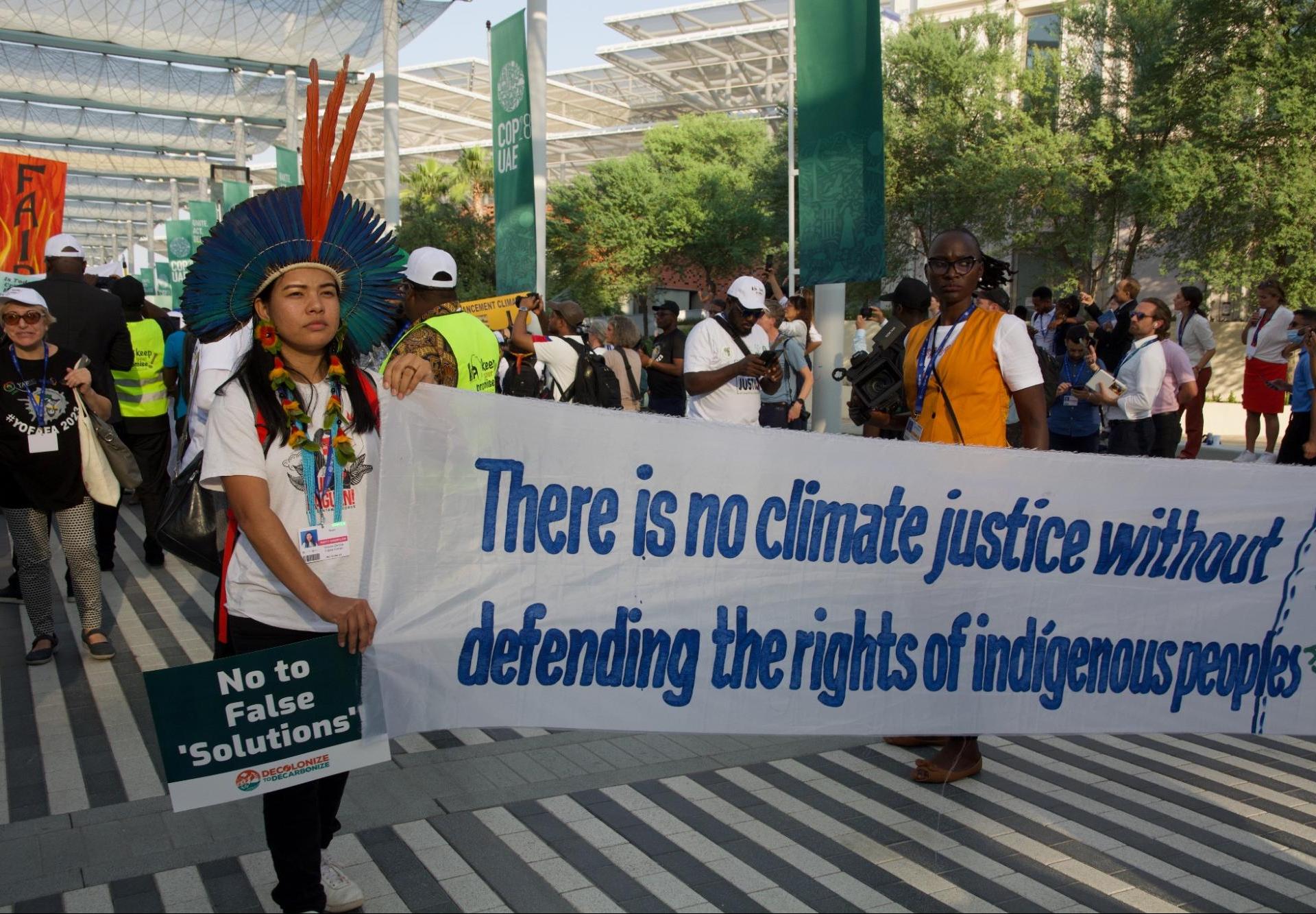Carbon markets, a popular mechanism used by global businesses and countries to offset their emissions, have been on the table during negotiations at the United Nations COP28 Climate Change Conference.
In a year that has seen carbon markets under growing scrutiny due to reports of alleged scams revealing that only a handful of emissions were offset instead of the massive amounts projected, Indigenous communities at the conference which ended this week were eager to be heard on how these could work.
“Trees are not objects. They are our brothers,” Selvyn Pérez, a Maya K’iche’ leader from Guatemala explained at an event organised on the sidelines of official COP28 talks. “There are reasons why we safeguard trees. We don’t do it for money or to receive benefits, we do it because nature is our mother, and Mother Earth is calling. If everyone understood that human and environmental rights were at the centre of all action, this COP would be very different”, instead of the lack of concrete action in past years,” he said.
An estimated 370 million Indigenous peoples live on 20 percent of the Earth’s land, protecting 80 percent of the planet’s biodiversity. Yet, only 17 percent of the $270m in climate and conservation funding invested annually in Indigenous and local communities goes to projects led by the populations.
Several of the extreme climate events throughout the world in the past year have spurred a sense of urgency among Indigenous communities who are the first to be affected.
For instance, a drought that began a year earlier in the Peruvian Andes, hit hard months later further downstream elsewhere in the region in the Amazon basin, making rivers impassable to transport and killing wildlife amid rising temperatures.
Researchers had already warned that the Amazon basin was reaching dangerous tipping points, due to large-scale deforestation limiting humidity in the region and causing even greater deterioration of vegetation because of stressful climate conditions.
Many representatives from the region had joined a record number of Indigenous people from around the world — including Pérez – in Dubai to defend their role as guardians of the rainforests and other natural lands which act as significant carbon sinks, storing nearly half of the world’s terrestrial carbon.
Like many other Indigenous communities who had never fully recovered the rights to their land since colonial times, the president of the Utz’ Che’ Community Forestry Network of Guatemala said the struggle to have their voices and rights recognised has been a long one.
“We didn’t come here to the COP to negotiate but to demand,” he said.
Shadow carbon market
Amid a booming market in emissions trading, which grew by 13.5 percent in 2022 to hit a record value of $909bn, Indigenous representatives have been trying to play catch-up and be more actively involved in schemes and their benefits.
Carbon markets are where credits are sold to countries and companies to help offset their carbon emissions. A draft proposal on how the mechanism can be regulated was under discussion between negotiators in Dubai after being submitted in November, a year later than expected.
Over the past year, multiple reports by media and nonprofit organisations shed light on how carbon markets – which may involve preserving natural areas from deforestation – have been providing false promises on their environmental value. Reports have also noted how offset buyers continue to emit despite the greening of their credentials, including with claims of reducing their carbon footprint.
Verra, a major carbon standard system, reportedly provided more than a billion credits, equivalent to a billion tonnes of carbon, of which 90 percent were said to be “phantom” or generally worthless and did not represent real carbon reductions. Verra disagrees with the allegations, saying they were “off track”.
The claims add questions to the general use of offsets, as many companies purchasing carbon credits, label their products as “carbon neutral”, giving customers the impression that they can continue to fly or purchase goods without contributing to the climate crisis.
In the Brazilian Amazon, carbon offset projects certified by Verra and bought by major global companies to fund forest protection were accused of being “scams” with little to show.
Elsewhere, in Colombia, information of a carbon credit sale, by national certifier ColCX, of an offsetting project in an Indigenous reservation failed to be shared with most of its inhabitants who should have been included as its beneficiaries.
Some Indigenous people have referred to the carbon credits as an extension of a colonial legacy that has sought to exploit and control resources in Indigenous lands.
Already threatened by rising deforestation due to illegal mining, logging and farming encroaching on their lands, which failed to be banned by leaders at an Amazon summit earlier this year, the region’s Indigenous communities are asking for more transparency in the schemes and, above all, involvement in project planning and implementation.
Finding solutions

In Dubai, they have been meeting with other local communities and Indigenous organisations to learn from each other.
“We need a clear carbon definition and know who owns those carbon rights and how do we ensure the distribution of revenue sharing of the carbon credit,” said Dominik T-Johns, convener for the REDD+ Technical Working Group in Liberia.
The REDD+ system, established in 2009 within climate negotiations, encourages developing country governments to mitigate emissions through forest management.
In the West African country, recent laws have set aside protected areas and recognised local communities as customary-law land owners.
Mary Molokwu-Odozi, a REDD+ project manager working with Fauna and Flora, a conservation NGO, said that “securing land tenure for local communities dependent on the forests would mean more effective forest stewardship and the potential to maintain the resources they have for future generations as well to deal with external influences”.
Walter Quertehauri Dariquebe, the president of the Amarakaeri communal reserve in southeastern Peru, explained that its “co-management” with the government has been an unequal arrangement, with the state holding the purse strings and the community responsible for administering state plans.
“We are not leaving it at that,” the Indigenous leader told Al Jazeera.
In addition to strengthening their capacities as project executors, they recently penned an agreement that gives the community the role of authorised managers of the carbon credit rights. “Why? It’s to avoid the issues of carbon pirates, which have communities give up their rights not knowing at what price the credits are being sold,” he said.
The reserve is creating a board for the sale of carbon credits to be in direct contact with end buyers. But legislation is not yet in place, he added.
With two years to go before the COP30 is held in Belém, at the mouth of the Amazon River in Brazil, Indigenous climate activists are already stepping up their calls for talks where they speak as equals with governments.
At an event hosted by Sônia Guajajara, Brazil’s minister of Indigenous peoples and a former Indigenous activist, Hindou Oumarou Ibrahim, an Indigenous leader from Chad and previously co-director of the World Indigenous Peoples’ Initiative at three COP climate conferences, had a few tips to offer as communities prepare for the global event in 2025.
“We have to have a clear plan, work with all partners and deliver on direct access finance, with great numbers,” Oumarou Ibrahim said at an inaugural meeting of the International Indigenous Commission in Dubai. ”We must stand together and say this COP must deliver on carbon reductions.”
Check out our Latest News and Follow us at Facebook
Original Source

